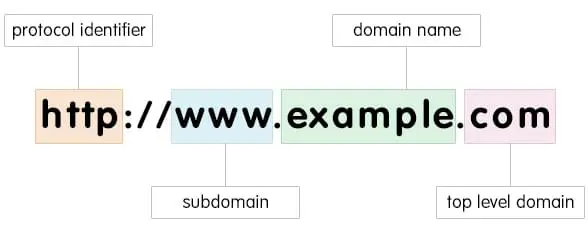You’re building something special online, and whether you’re starting fresh or taking your offline business to the web, your domain name is more than just a web address: it’s how people find you, remember you, and know they’re in the right place.
This guide covers everything you need to know about domains and how to find and buy the right one.

Let’s say you’ve got an idea. A small business, a side project, maybe something you’ve been meaning to do for ages.
First thing you’ll want is a name — not just for you, but for the internet to find you.
That’s what a domain name’s all about.
It’s the bit people type in to get to your website. Short, memorable, and entirely yours (as long as no one’s nabbed it already).
In this guide, we’ll cover:
☑︎ What a domain name is
☑︎ How to buy one in five easy steps
☑︎ What to do if the name you want is already taken
☑︎ A few good tips for picking a web address
Plus answers to the common questions like how much a domain costs (and even how you can get one for free).
What is a domain name?
A domain name is your street address on the internet — it’s what people type into their browser to visit your website.
It’s typically made up of three main parts:
1. The Subdomain
Like “www” or “blog.” — these help organise websites into sections or versions (for example, “shop.yoursite.com” or “m.yoursite.com” for mobile).
2. The Second-Level Domain (SLD)
The main bit in the middle, and the unique identifier — usually your brand or business name.
3. The Top-Level Domain (TLD)
The extension at the end like .com, .co.uk, or .design, which often hints at the site’s purpose or location. Or you might just choose an extension because it’s easy for everyone to type it and say it.

Together, all these parts make up your domain name. It’s a unique way for people to find you online.
Behind the scenes, the internet uses IP addresses (long numbers) to connect names to websites.
A system called DNS (Domain Name System) works a bit like a phonebook. It matches each domain name to the right web address, so visitors land on the right page. But that’s enough technical stuff for now.
See also: A Beginner’s Guide to Domain Names and What is DNS?
Why domain names matter
Your domain name is more than just an address — it’s often the first thing people see. It helps customers remember you, find you again, and share your website with others. A good name can give the right impression from the start.
Domains are in huge demand, with nearly 360 million already registered worldwide — and that number keeps growing. So picking the right one (and grabbing it before someone else does) is a smart move.
Owning your own domain also gives you control. You can set up a custom email address, link it to a professional website, and build a name that’s yours — no one else can use it while it’s registered to you.
And because we form first impressions about a webpage in just 50 milliseconds, having a name that’s short, clear, and easy to say can really help people feel confident about your site.
One study from the Growth Marketing Conference found that 75% of people judge a company’s credibility based on a domain name and design.
Users are 60% more likely to trust a site when the domain ending matches where they are — for example, a .uk domain for UK visitors.
People are more likely to click, share, and stick around when the domain name looks professional and matches up with what the site is about.
In short: if you want to be taken seriously online, you’ll want your own domain.
-
☑︎ Stronger branding
-
A memorable name helps people recognise and come back to you
-
☑︎ Better first impressions
-
Your domain is often the first thing people see
-
☑︎ Greater credibility
-
A professional-looking domain builds trust online
-
️☑︎ Word of mouth impact
-
Short, catchy names are easier for people to share
-
☑︎ Improved search visibility
-
Keywords in your domain can help with search rankings
How to buy a domain name (in 5 steps)
Choosing the right domain name is a key step when setting up your website. It’s more than just a web address — it’s how people will find you, remember you, and recognise your brand online. A well-chosen domain can make your business stand out and feel more trustworthy to visitors.
Your domain name will appear everywhere: in search engines, on social media, in emails, and even on business cards. So, it’s important to pick one that fits your brand and is easy for customers to recall and share.
Taking a little time to get it right now can save you headaches later on. Once you’ve got the perfect domain, it sets a strong foundation for business or project online.
Step 1: Choose the domain name you’d like
Picking the right domain name is one of the most important first steps. Think about a name that fits your business or idea well — something that’s easy to say, spell, and remember.
Shorter names tend to stick better, but it’s also important it reflects what you do or what your brand stands for. That way, customers can spot you easily online and remember where to find you next time.
Don’t worry if you’re not sure yet — we’ll cover some tips on choosing the perfect name a bit later.
Step 2: Check availability
Before you can use your chosen name, you need to see if it’s free to register.
You can check a domain name’s availability using the 123 Reg domain search — an easy way to try out possible web addresses and see if anyone else already owns them. You’ll also be given lots of suggestions for domain names that are available.
Step 3: Select your domain extension
Picking the right domain extension, or TLD (Top-Level Domain), is an important step because it helps visitors understand what your website is about and can influence how trustworthy your site looks.
There are classic TLDs like .com, .net, and .org, which have been around for decades and are widely recognised worldwide. These extensions often carry a sense of authority and credibility — especially .com, which is still the most popular choice for many big businesses going for a global audience.
Then there are country-code TLDs (ccTLDs) like .co.uk, .uk, .fr, or .de. These are perfect if you want to highlight your connection to a particular country. Using a local extension can also help with local search engine rankings and build trust with customers in that area — think .london or .scot.
Newer “Generic” (gTLD) endings like these are growing fast — up nearly 16% year-on-year. They’re popular because they’re more specific, easier to get, and can help your name stand out. In recent years, a bunch of new, niche, or creative extensions have popped up — think .tech, .shop, .ltd, .info, .ai, .io, and many more.
These can be a fun way to make your domain memorable and clearly show what your business is about. They also give you more options when popular names with traditional endings are already taken.
Step 4: Register your domain
Once you’ve picked your name and extension, it’s time to register it. Just follow the steps at checkout, choose how many years you’d like to register it for, and add extras if needed (like privacy protection).
Step 5: Set up domain services (Connect it!)
Now your domain’s yours, it’s time to link that web address to your website or email.
You’ll do this from your 123 Reg Control Panel — just log in, choose what you’d like to connect (like a website or email), and follow the steps. If you’re using 123 Reg for everything, the hard work is already done for you.
Tips for finding the right domain
Finding a good domain for is important because it helps visitors remember you and builds trust. Here are some tips:
☑︎ Keep it short, simple, and easy to spell.
☑︎ Make it unique and brandable, not just generic keywords.
☑︎ Avoid numbers, hyphens, and complicated spellings — these can confuse people.
☑︎ Check if it’s easy to say out loud so people can share it by word of mouth.
☑︎ Use a trademark lookup tool to avoid legal issues.
For more tips on choosing your domain name, check out: Names That Click – How to Choose the Right Domain Name
What if the domain I want is already taken?
If your chosen domain name isn’t available, don’t worry — there are still loads of options. With hundreds of domain extensions now available (like .co.uk, .net, .shop, .design or .online), you’ve got more choice than ever.
When you use 123 Reg’s domain search, you won’t just see if your ideal name is free — you’ll also get plenty of smart suggestions. These might include different extensions or variations that could work just (if not better) for your site.
Get creative by adding a word or two to your name. Try a prefix like “get”, “try” or “go”, or a suffix like “store”, “online” or “UK”. For example, if “brightbakes.com” is taken, you could try “getbrightbakes.com” or “brightbakes.uk”.
Domain Brokerage
If you’ve got your heart set on that exact name, you could contact the current owner directly or use a domain brokerage service to help negotiate a deal. But often, it’s quicker and easier to brainstorm a few fresh ideas. You might even land on something better.
See also: Domain Names and Trademarks: A Guide for Your Online Brand
Does it matter where I buy a domain?
Not all domain providers are the same, and choosing the right one can make managing your domain much easier as your business grows.
Obviously, great customer support is important. Having helpful people to turn to can save you time and headaches if you ever run into problems.
With 123 Reg, you can easily add Website Builder or WordPress to get your site online quickly — no technical skills needed. If you want more control or higher performance, Web Hosting is also available, giving you space and power to grow your website as needed.
Getting a professional email address that match your domain help you look credible and make it easy for customers to get in touch. With 123 Reg, setting up and managing your email is simple, so you can focus on your business.
An easy-to-use control panel means managing your domain, renewals, and settings is straightforward — less time figuring things out, more time doing what matters.
You’ll also need an SSL Certificate to help protect the data on your site and give visitors peace of mind. Again, most 123 Reg plans include SSL for free.
How much does a domain name cost?
The price of a domain name can depend on several factors, including the extension you choose, the length and popularity of the name, and how in-demand the keywords are.
Some domains cost just a few quid a year — often cheaper than you’d expect, not much more than the price of a few cups of coffee.
Others can be more expensive, especially if they’re short, catchy, or use common words. These tend to feel more established and are often seen as more valuable because they’ve been registered for a while.
Classic endings like .com and .co.uk have been around for decades, so many of the obvious names are already taken.
That said, there are still plenty of great options with more specific wording. 123 Reg offers over 400 TLDs. There’s a good chance you’ll find a name that fits and without breaking the bank.
Premium domains
Some domain names have already been registered by someone else and are being resold. These are called Premium Domains and tend to be the most expensive web addresses out there, especially if the name is short, catchy, and involves a popular word or phrase. Think of them like flagship shop on Oxford street — not essential, but some people are willing to pay extra.
See also: The Most Expensive Domain Name Ever Sold
Optional extras
When you register a domain, you also have the option to add Domain Ownership Protection. This helps keep your name and contact details private by hiding them from the public database that’s linked to your domain.
It also adds extra security features — like stopping your domain from being transferred or changed without your permission. It’s a simple way to help protect both your privacy and your domain.
Renewal
Remember that, when you buy a domain, you’re not buying it forever — you’re renting it yearly, and you’ll need to renew it to keep hold of it. Renewal prices can sometimes be a bit higher than first-year offers, so it’s worth checking that before you buy.
FAQs
What’s a domain registrar?
A domain registrar is a company that lets you buy and register a domain name — in other words, it sells you your website’s address.
What’s the difference between a domain registrar and a web host? Simple: the registrar sells you the name, and the host provides the space where your site actually lives online (so you don’t need to keep a server humming away 24/7 in your wardrobe).
At 123 Reg, we’re both a domain registrar and a web host — and after 25 years in the game, we know our stuff!
Can I register a domain name for free?
It’s tempting to look for a free domain when starting out, especially if you’re on a tight budget. Some providers do offer free domains, but these often come with strings attached — like ads on your site or limited control over your domain.
At 123 Reg, we make it easier to get started without hidden catches. When you buy products like Website Builder, Managed WordPress Hosting, or Web Hosting, you get a FREE .online domain included. You’re in full control and there are no pesky ads to interrupt your visitors’ experience.
Can I use the domain name right after I buy it?
Yes, once you’ve registered your domain and paid for it, you can start using it straight away—whether that’s setting up a website, creating custom email addresses, or forwarding it to another site.
What can I do with a domain name?
You can use your domain for a website, blog, online shop, or even just for a professional email address. It’s your online address, so you can point it wherever you like.
Think of your domain as a digital asset — something you own and build on over time. It’s not just a name, it’s your space online. From search engine visibility to email branding and future-proofing, your domain gives you control and flexibility that social platforms or free sites just can’t match.
Should I get multiple domain names?
It’s often a good idea to register similar names or common variations (like .com and .co.uk) to protect your brand and stop competitors or copycats.
Which domain is best for the UK – .com, .co.uk or .uk?
If you’re running a British business, one of the biggest decisions is choosing between a .com and a .co.uk domain. Both are well known and trusted, but the right choice depends on who you want to reach and how you want your brand to feel.
A .co.uk domain shows you’re local and can help build trust with UK-based customers, while a .com is recognised worldwide and works well if you want to attract people beyond the UK.
There’s also the much younger .uk domain. Shorter, easy to say and type — it’s a good alternative to .co.uk and has become very popular with UK businesses looking for a British web address.
Many businesses choose to register both to protect their brand and make it easy for customers to find them, no matter which domain they use. Remember: you can always buy multiple domains to cover all bases!
See also: .com vs .co.uk: Which Domain is Best for Your British Business?
Can I permanently buy a domain?
No, you can’t buy a domain name forever. Domains are registered for a set period (usually a year at a time). But while it isn’t technically possible to buy a “forever” domain, the good news is you can keep renewing your registration for as long as you need it. Of course, when domain names matter so much to the success of an online business, that’s really important!
Wrap up
A good domain name is more than just a web address — it’s the start of your online identity. Whether you’re launching something new or giving your business a fresh look, the right name can make all the difference.
Start your search for a domain with 123 Reg now and find a domain that fits. With 400+ extensions to choose from, there’s a match for every business.






